Text
Smertka
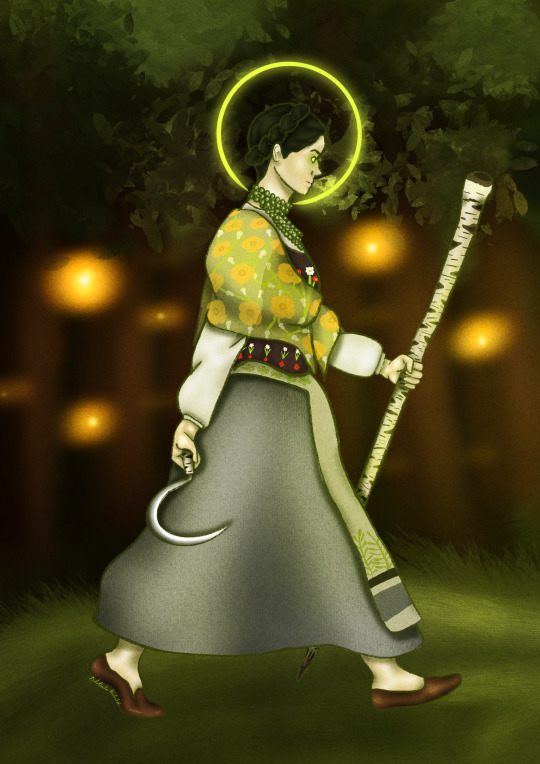
2 notes
·
View notes
Text
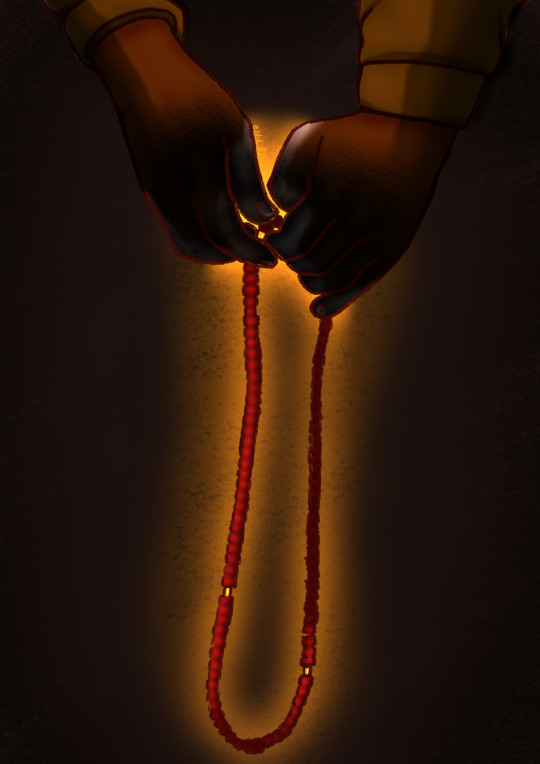
In doing some family research, I found that it’s likely my great-great grandfather, who’s generally remembered in our family as a founder of a church and priest, may have worked in or around coal mines. So I started having feelings about that particular experience and here we are
1 note
·
View note
Text
This is Slavic pagan tumblr’s reminder that Patricia Woodruff is a hack that can’t take criticism with a fake PhD
#paganism#slavic polytheism#slavic folklore#slavic paganism#slavic#pagan#slavpol#slavic pagan#Slavic posting
6 notes
·
View notes
Text
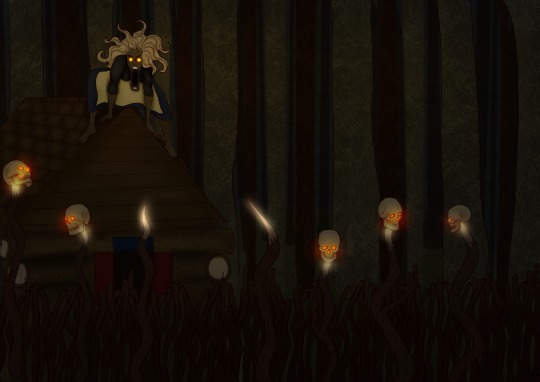
1 note
·
View note
Text
I am going to put this art in my mouth

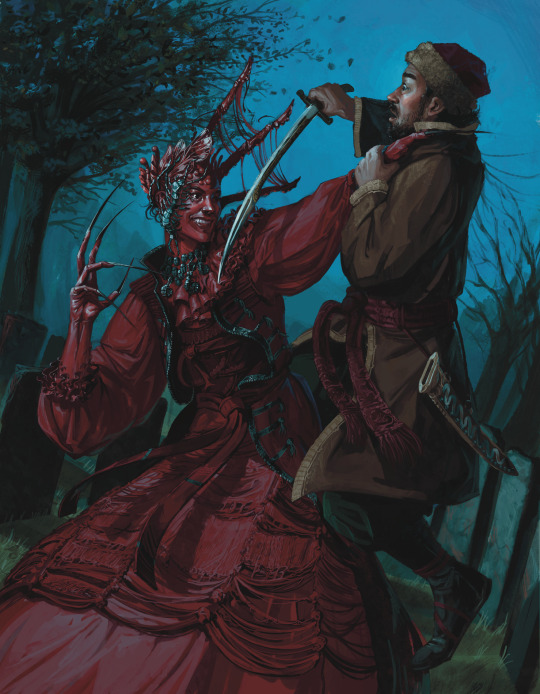
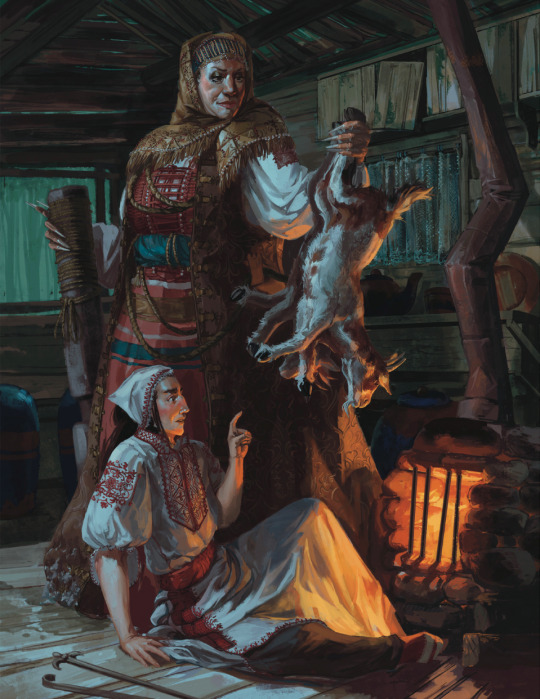
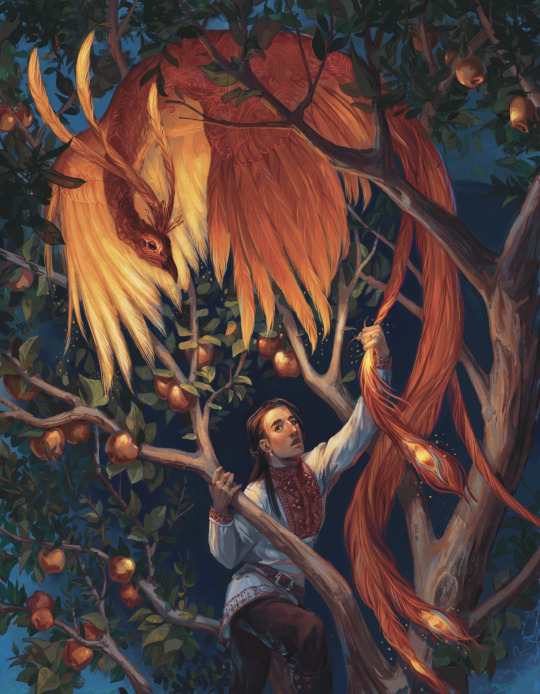
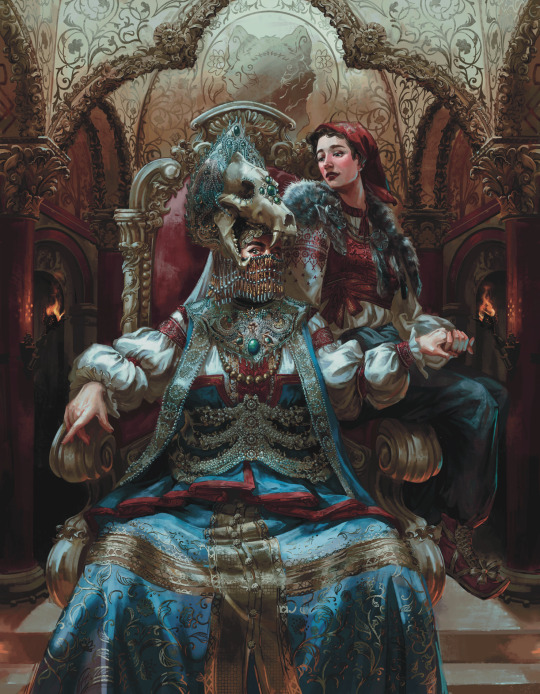
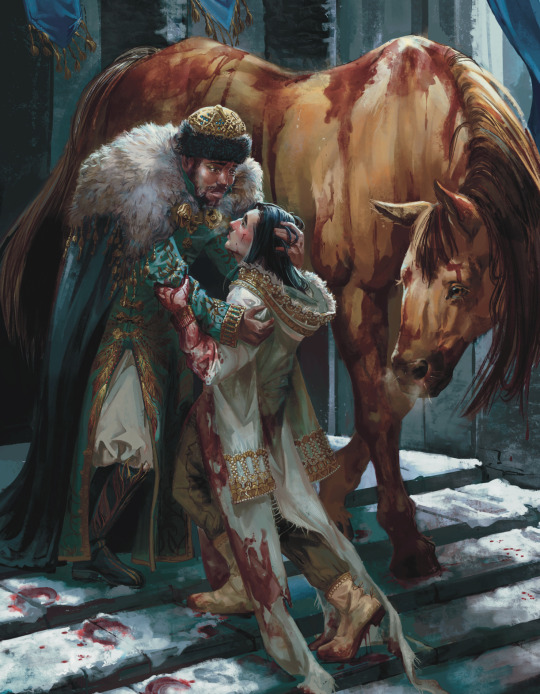
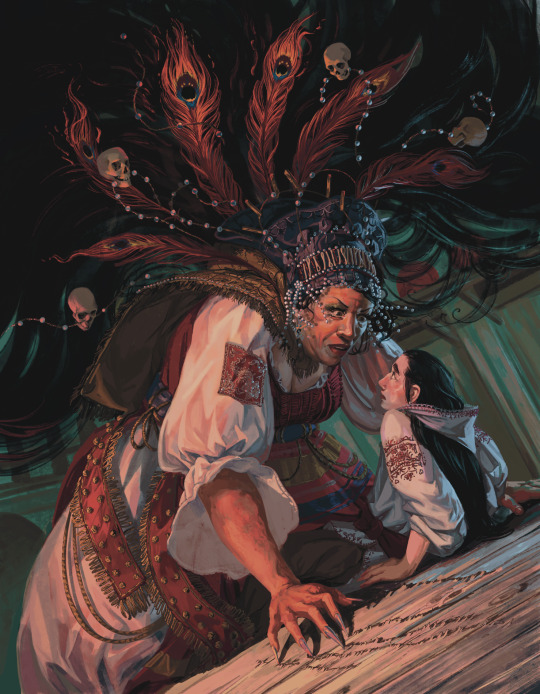
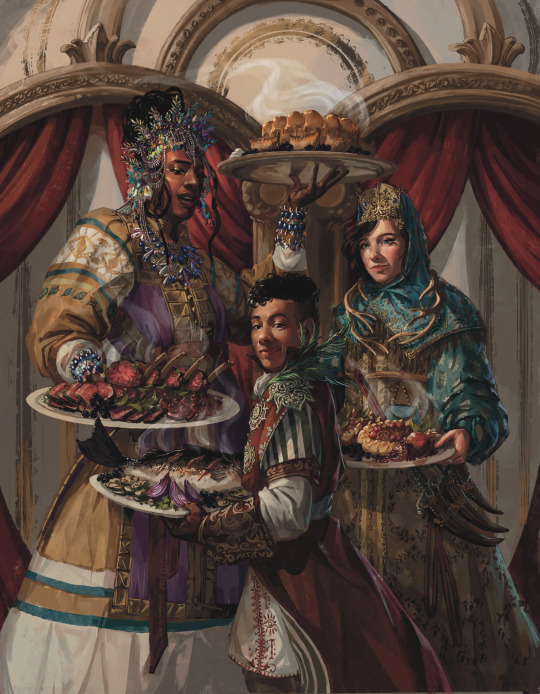

Illustrations from Tales From the House of Baba Yaga by Emory Kjelsberg
4K notes
·
View notes
Text
Thinkin about the theory that Mokosh’s death-fate aspect may have been split from her and into localized interpretations of death during Christianization. Fate can’t exist without death
3 notes
·
View notes
Text
ITS PUSCHANYA BITCHESSS
What is Puschanya?
More commonly called Maslenitsa, Puschanya is an East Slavic holiday that takes place on the week before the Great Lent (for the year of 2024 this is March 11 through March 17). It’s quite similar to Mardi Gras, in which it’s a week of people feasting and hosting a bunch of different events, which generally culimate with a burning of an effigy of Maslenitsa, similar to Marzanna drownings in Polish traditions.
How Can I Celebrate Puschanya?
❈ building a small effigy of the goddess of winter and destroying it
❈ making pierogi
❈ making blini (similar to crepes)
❈ visiting family and friends, sharing meals, and giving gifts on “Forgiveness Sunday” (March 17) and throughout the week
❈ spend time doing outdoor activities, like hiking, snowball fights, etc.
Although it’s primarily a Christian holiday at this point, there’s a great deal of suggestion that Maslenitsa predates Christianity; evidence suggests that the tradition dates to the 2nd century CE. The holiday maintains its’ pre-Christian roots quite obviously with the burning of the effigy and petitions for the onset of spring. It’s a fascinating example of how folk religion can develop through the merging of two traditions.
art by Valeriya Marakova

2 notes
·
View notes
Text

0 notes
Text
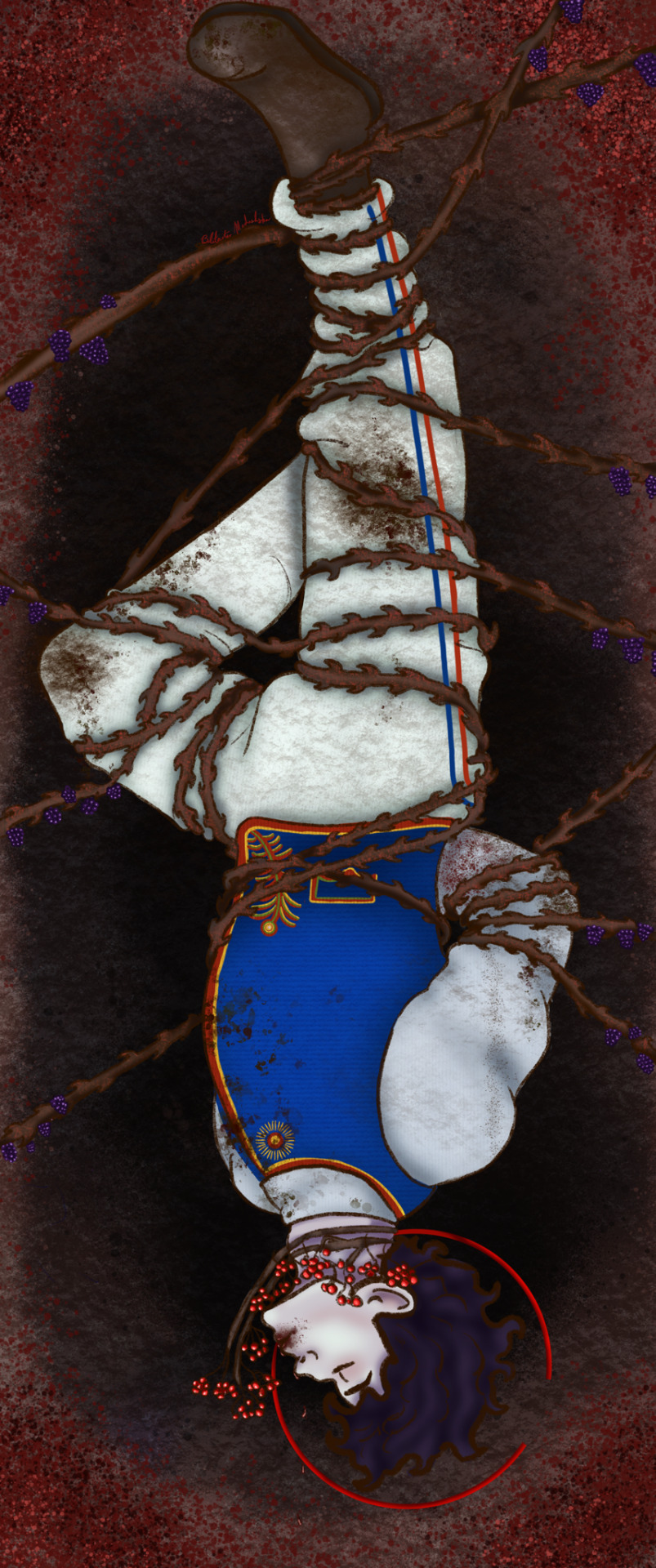
“Among the Lemkos, arms and legs of feared dead were bound with stems of blackberry or wreaths of garlic, and garlands of hawthorn were put on their necks (Kosiek 2011, 224).”
From ‘A Grain Against a Vampire? Some Remarks on So-Called Anti-Vampire Practices in the Light of Archaeological and Folkloristic-Ethnographic Data’ by Kurasiński, Skóra, and Gayduchik:
4 notes
·
View notes
Text
thinking a Lot about the ethics of archaeology as a destructive science today
1 note
·
View note
Text

Thinking a lot about Christo-pagan syncretism lately. Have some Saint Veles
39 notes
·
View notes
Text
good morning, lgbtq is officially banned in russia. today russian supreme court announced that “LGBT movement” is “extremist”. it means extreme risks and criminal persecution.
please find a moment to sign this petition to german bundestag to allow trans people from russia to seek asylum in germany faster and easier. you can sign from anywhere, regardless of citizenship.
(sorry for the preview, i ban cookies aggressively)
UPD: I added instructions https://www.tumblr.com/szelkovica/735463074492022784/instructions-follow-the-link-and-click-petition?source=share
3K notes
·
View notes
Text
My Slavic Polytheist Calendar
Every Slavic Polytheist will have their own calendar constructed based on where they are from, what deities they worship, and any number of other personal preferences they may have. As such, beginners will often find themselves incredibly confused on where to start, which either leads to decision paralysis or trying to shoehorn Slavic traditions into the Wiccan wheel of the year, which doesn't usually go well because of the very different nature of these two practices, no matter how syncretic one of them tries to be.
With this in mind, I've decided to share the calendar I use in my practice on my blog and my TikTok, though this will have more detail than the video. It's important to note, though, that my calendar takes my needs and preferences into account above all else. This means that it is primarily influenced by Carpatho-Rusyn Orthodox traditions, the ADF's calendar, common East Slavic celebrations, and a combination of Lemko and American traditions.
❆ Winter ❆
January 7 - Epiphany
It's Christmas, except your dad might go outside and threaten any trees that didn't bear fruit last harvest with an axe and you might summon a demon to see what your future husband looks like. You will also stack bread in a mountain at the end of your dinner table in hopes of bringing prosperity into the upcoming year.
January 8 - Fašengy Begins
To be totally honest, the dating on this holiday is confusing as all get out. It's essentially a Slavic Mardi Gras but, depending who you ask, it can also simply be the season where a lot of people in your community get married and/or start having children. I mark this date because that's when the marrying and child rearing begins, but Fašengy festivities in Rusyn communities typically don't start until the day after Epiphany and ends on Ash Wednesday, when Lent starts. During these festivities, you would eat, drink, be merry, and try to get married.
January 13 - Malanka
New Year's Eve celebrations. Prepare for a small army of children to wish you well in the morning. If you're a laborer, enjoy the day off but also worry about your contract being renewed.
January 14 - New Year's Day
Continuation of well wishes and repeating your wishes from Christmas in hopes that they come true in the upcoming year.
February 1 - Winter-Cross Quarter on the ADF's Calendar
Much like New Years, its time to begin establishing your wishes and vision for the upcoming year while shedding the old year.
February 11 - Veles' Day or the Festival of Veles
Sometimes celebrated on the 24th of February, Veles is venerated on the same date(s) as Saint Blaise, an Orthodox and Catholic saint that Veles has become syncretized with because of their shared patronage of flocks and herds. In neopolytheist communities, it is common for Veles to be offered milk and ritual fights will be organized. It is taboo to eat veal on this holiday, as Veles is being asked for protection of herds, including cattle.
❀ Spring ❀
March 11 - Maslenitsa Begins
Maslenitsa aligns with the last week of Fašengy as the last week before Lent. In some cases, this week is treated as the final goodbye to winter, in others, that doesn't happen until later on in the year. During Maslenitsa, it's customary to make blini, dance, sing, and generally indulge in any distractions of your choosing before the more reflective season of Lent begins. Each day of Maslenitsa is dedicated to different activities, family bonding, snowball fights, sleigh rides, and more
March 17 - Maslenitsa and Fašengy End
Lent has begun
March 21 - Komeoditsa & the Spring Equinox
Are you a fan of bears? Are you a fan of Spring? This is the holiday for you. In some cases this day is celebrated during Maslenitsa depending on when the week occurs. I personally choose to keep it more aligned with the Spring Equinox because of the importance of bears in my practice, so I will celebrate it differently from what is traditional. It is also an ADF holiday that centers perserverance.
March 28 - Passion Week Begins
A celebration of Jesus' triumph over Death. Fasting is strict and each day has its own theme, which is usually chanted about at the beginning of each day. Date of this holiday varies yearly.
May 1 - Spring Cross-Quarter
An ADF holiday that centers around fertility and honoring the budding nature around us.
May 1 - Dziady Begins
One of two, Dziady translates to "forefathers eve", it is a night in which the ancestors are venerated, celebrated, and communed with. Similar to Samhain or All Souls Eve.
May 2 - Dziady Ends
May 2 - Day of Young Shoots
A holiday in which young pine shoots are candied. There's not a wealth of easily accessible information on this holiday.
May 4 - Passion Week Ends
Fasting and restriction have occurred. If you're a witch, you have conducted a pilgrimage.
May 5 - Easter
Jesus is back baby. Here's some chocolate. Just kidding, this is a Rusyn household. You will be recieving horseradish, butter, sausage, pascha, salt, ham, pysanky, cheese, bacon, and a candle because we can eat meat and dairy again.
May 6 - Saint George's Day
Today's all about your livestock. Be happy they're here and do what you can to protect them.
May 14 - Radonitsa
Honor your dead, go visit the cemetery, and keep it clean.
𖤓 Summer 𖤓
May 28 - Green Week Begins
We're honoring the dead again, but this time they're in the trees.
May 30 - Zmeynik
Hey it's warm enough that the snakes are back! Be nice to them!
June 4 - Green Week Ends, Semik
Get the rusalki back into the lakes lest they start drowning our men. We do this by having a nice meal.
June 19 - Mokridy
Mokosh please let it rain. Please.
June 20 - Perun's Day
PERUN PLEASE LET IT RAIN
June 21 - Sobitka (Summer Solstice)
Fire! There is fire! Jump over it or be alone forever. Also there's a plant you can look for to see if you can talk to animals. The witches are gathering again and you know that one rich guy everyone hates? Set his farm on fire and thank the Zbeeynicks. For the ADF calendar, this day centers awakening and moderation.
June 24 - Saint John's Day
Sometimes celebrated on June 22, today's the day to gather your herbs and get them blessed so you can use them for the rest of the year!
August 1 - Summer Cross-Quarter
An ADF holiday centering courage and preparing for the harvest season
August 15 - Our Lady of the Herbs
All the plants are blessed. Thank you Mother Mary.
☾ Autumn ☽
August 19 - Apple Feast of the Savior
We're harvesting apples. Autumn is starting and you will only eat apples.
September 23 - Dozynki & Autumn Equinox
Hell yeah harvest time! Appreciate your laborers, give them a feast and bless their bounties. This is another ADF harvest holiday that centers Integrity.
October 28 - Festival of Mokosh
There isn't a lot of historic information on this holiday, though its generally associated with the feast of Saint Paraskeva. Eat, drink, be merry, and embroider.
October 31 - Dziady Begins
The forefathers are back.
November 1 - Dziady Ends & Autumn Cross Quarter
The forefathers have been honored. This ADF holiday centers honoring the dead and pursuing wisdom.
November 29 - Andrzejki
Saint Andrew's Day! Fuck the nobility that subjugates you, harvest your crops and have a good time. Ladies, this is another opportunity to find out who your future husband is.
❆ Winter ❆
December 20 - Szczodre Gody Begins
Christmas. But not. Lots of feasting, merriment, and decorating of trees.
December 21 - Koliada, the Winter Solstice
Szczodre Gody continues, but it's officially the longest night of the year. The ADF calendar centers Hospitality on this date.
December 25 - Szczodre Gody Ends
Do divination until Epiphany.
10 notes
·
View notes
Text
I recommend zarya-zaryanitsa's masterpost for getting started. Beyond that, I think the information you want to pursue will be determined more easily by what sub-set of Slavic paganism you're looking at. Do you have a specific nation, region (South, East, West), or district/county you want to look into?
Edit: Re your questions to the other person who responded to the post, Slavic paganism has a LOT of issues surrounding Nazi sympathies, nationalism, and racism. It's comprable to the Norse pagan community when it comes to how and why those issues are present
Looking for info on Slavic paganism
If you know anything please drop some info into my questions box or @ me in any helpful posts
34 notes
·
View notes
Text
Getting emotional about the idea that early Orthodox Russians believed that the human face was made in the image of God while knowing at the same time that many believe that humans made pagan gods in their own image as a way of understanding them. There's some deeper poetry there, but it's got me thinking about how, regardless of approach, we just seek reasons that we aren't alone.
0 notes
Note
Hi! I hope you're well! I recently came across the term guślarz in the context of Slavic pre-christian practices and I was wondering if you know of any information/sources that discuss them? Thank you!
Honestly I do not know any sources that discuss guślarze specifically but I can convey to you what little I am aware of regarding the use of this word.
So firstly, guślarz is a Polish word. Similar words no doubt exist in other Slavic languages but I am only focusing on the role of this term in Polish language because that’s what I know.
The word guślarz is derived from gusła meaning magical rituals of some sort. Guślarz is a man who practices magic, performs rituals, a folk healer, a sorcerer. His feminine counterpart is guślarka (historically this one was used much less often but still can be found). The word gusła took the meaning of „magical rituals” and „fortune telling” in XVth century - so pretty late. My sources on this are two Polish philologists, linguists and slavists Franciszek Sławski (as relayed to us by Krzysztof Bilica and PWN dictionary of Polish language) and Andrzej Bańkowski (as relayed to us by Monika Grotek). Word guślarz is first found in Polish language in XVIIth century, evolving from earlier words gusłarz and guślnik dating back to XVIth and XVth century.
I will try my best to translate what Monika Grotek has to say on the subject of guślarz in her article Etymologia polskich nazw postaci ludzkich rodzaju żeńskiego i męskiego parających się magią (Etymology of Polish names for people, male and female, who practice magic):
However, the authors of etymological dictionaries argue about the origin and original meaning of the word gusła. Bańkowski conservatively recognizes the difficulty in unambiguously determining the etymology of, in his opinion, the Polish relic word †guslo, which was probably in the form †gud-slo and meant 'ways to ward off evil powers', and derived from the verb gud-i-ti, which in Old Russian meant as much as 'to blame, to condemn' and is related to the synonymous common Slavic †gad-i-ti 'to make disgusting, to disgust' (hence, e.g. the word gad) and the later †gyd-i-ti derived from it, 'to repulse' (hence hydzić and ohyda). Thus, a sorcerer is likely a man dealing with protection against disgusting and socially condemned evil powers, expelling hideous demons or counteracting charms.
On the other hand, Wiesław Boryś notes that the word gusła may come from *gud-slo or *gǫd-slo (plural *gudsla or *gǫdsla), in which we can find the name of an activity with the suffix *- slo originating from the Proto-Slavic *gǫsti, *gǫdǫ 'to play a stringed instrument' (hence e.g. the instrument gusle), or from the variant †gusti, †gudǫ (with the old alternation *u/*ǫ), which is also indicated by the Bulgarian gùsla/gъsla, meaning 'stringed instrument, gusle'. Therefore, the original meaning of the word guslo is 'playing a stringed instrument', 'playing gusle' - and music, with its ability to induce a state of trance could be used in magical ceremonies performed by a sorcerer who, thanks to music and through music, was able to make contact with the supernatural world like a shaman in the native cultures of the peoples of Africa or America.
Here you have two sound theories on the role and conception of guślarz.
The modern associations of the word guślarz in Polish language originate from much later times - the Romanticism and Dziady (eng. Forefathers Eve) a XIXth century poetic drama written by Adam Mickiewicz. The drama describes in it’s second part a folk ritual known as dziady, typically a feast commemorating the ancestors. In the drama however guślarz accompanied by a crowd of villagers summons ghosts of people who for some reason cannot enter heaven and tries to help them access it.
Funnily enough originally the character conducting the ceremony was a priest. Mickiewicz changed it to guślarz at a later stage of his work. The later version also includes a line about how the priest forbade people from conducting the ritual. It is speculated that the character of guślarz was added specifically to include more magical and folkloric motifs that Romanticism was all about.
This is where we get the dominant view of guślarz as a man who works with the souls of the dead, this is also quite literally where we get guślarz as seen in The Witcher 3 (Pellar), since quests connected to him are heavily inspired by the drama Dziady and some of his incantations draw directly from its text.
In modern Polish the words gusła and guślarz are slightly archaic and have a pejorative undertone, with gusła being used as something synonymous with „superstitions”.
When it comes to pre-Christian Slavic traditions you might have more luck researching words such as zhrets (pl. żerca) or volkhv (pl. wołchw) which I believe are a bit better explored than guślarz.
Best of luck!
Zarya
26 notes
·
View notes
